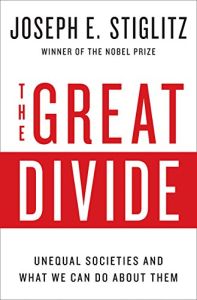Join getAbstract to access the summary!

Join getAbstract to access the summary!
Joseph E. Stiglitz
The Great Divide
Unequal Societies and What We Can Do About Them
W.W. Norton, 2015
What's inside?
Economist and Nobel laureate Joseph E. Stiglitz, who helped coin the term “the one percent,” believes inequality damages the US economy.
Recommendation
Nobel laureate Joseph E. Stiglitz believes financial inequality undermines the US economy. A former adviser to President Bill Clinton and a critic of President George W. Bush, Stiglitz makes no claim to ideological impartiality. He helped coin the terms “the 1%” and “the 99%” to describe the gap between the ultra wealthy and everyone else. This collection features his writings from Vanity Fair, The New York Times, Politico and other media outlets. As a result, you may find some parts repetitive, but Stiglitz’s sage insights stand out. While always politically neutral, getAbstract recommends his text to investors, CEOs, policy makers, students of business and politics, and all those concerned about the yawning economic gaps in modern society.
Summary
About the Author
Nobel Prize-winning economist Joseph E. Stiglitz teaches at Columbia University. He is the author of the bestsellers The Price of Inequality, Freefall and Globalization and Its Discontents.



















Comment on this summary